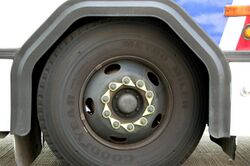Engineering:Loose wheel nut indicator


A loose wheel nut indicator is a measuring tool that warns of loose wheel nuts, which is the most common cause of wheels on vehicles falling off.[1]
History
In 1990, Mike Marczynski, who was responsible for a commercial vehicle fleet, developed the locking system for lug nuts and initially marketed them in Great Britain under the Checkpoint brand name. His invention is now available in more than 90 countries on 6 continents. The product has also established itself in Germany, and trucks with the safety system can be seen more and more frequently on the Autobahn. The original loose lug nut securing product, the Checkpoint, has been supplemented by other products such as Dustite and Dustite LR which combine the function of a lug nut indicator with a dust cap, providing additional corrosion protection for bolts and nuts. Wheel overheating due to problems with the brakes and/or ball bearings is a common problem for vehicle operators. To solve this problem and improve the safety of vehicles using the products, indicators equipped with an overheat indicator have been developed. For this purpose, specific polymers were used, which first deform and then melt at elevated temperatures. Lug nut indicators made of a material that can withstand high temperatures were developed especially for the needs of rescue vehicles, where the driving and braking behavior is significantly different. Its melting point of 165 °C is considerably higher than that of the standard version (melting point at approx. 125 °C).
Operation
The Checkpoint / Dustite / Dustite LR is attached to two adjacent wheel nuts in such a way that the respective indicator tips point towards each other. Should a lug nut become loose, the pointer will move in line with the movement of the lug nut, i.e. the tips no longer point to each other. The wheel nut indicators allow not only a quick and efficient check of the wheels by the driver, but also by the control authorities. In addition, the inspection can be easily documented with a photo (including the date).
Mechanical indicator

A common type of loose wheel nut indicators are small pointed tags, usually made of fluorescent orange or yellow plastic, which are fixed to the lug nuts of the wheels of large vehicles.[2] The tag rotates with the nut, and if the nut becomes loose, the point of the tag shifts noticeably out of alignment with the other tags. If too many lug nuts are loosened, the wheel can detach from the wheel stud; loose wheel nut indicators allow identification of loose nuts before this can occur.
Loose wheel nut indicators or lug nut indicators are used both by auto mechanics and drivers to identify lug nuts which require tightening, as well as by accident investigators to detect faults after accidents. Although generally not compulsory, road safety bodies frequently recommend their use,[3][4][5] especially on large or heavy vehicles such as buses, coaches, large vans, and trucks.[6][7][8]
An alternative to wheel nut indicators is to add a torque stripe. This is a small strip of polymer connecting the nut to the surface it is fastened to which breaks if the nut loosens.[citation needed]
Electronic sensor
Advancements in anti-lock braking systems (ABS) have made it possible to detect loose wheel nuts by using sensors from the ABS system in the car's software.[9] The system functions by detecting and recognizing vibrations which could indicate a loose wheel.
In 2018, Audi launched electronic wheel nut indicators on some of their more expensive models,[10] and by 2021 Audi had sold over 1 million cars with the technology.[11]
See also
References
- ↑ (in en) Crashes caused by loose wheels are preventable, but safety device rarely used, https://www.youtube.com/watch?v=9w5ThXwuRJI, retrieved 2022-11-22
- ↑ "What are the yellow plastic indicators on truck and bus wheels?". May 27, 2019. https://www.drivingtests.co.nz/resources/what-are-the-yellow-plastic-indicators-on-truck-and-bus-wheels/.
- ↑ "Transport for New South Wales, Safety Technologies for Heavy Vehicles and Combinations, P.11". https://roadsafety.transport.nsw.gov.au/downloads/safety-technologies-heavy-vehicles.pdf.
- ↑ "NZ Transport Agency, Wheel Loss Information Sheet, P.2". https://www.nzta.govt.nz/assets/resources/wheel-loss/docs/wheel-loss-info-sheet.pdf.
- ↑ June 23; Bookmark +, 2015 • Wheel-Check •. "Wheel-Check Loose Nut Indicator". https://www.government-fleet.com/298291/wheel-check-loose-nut-indicator.
- ↑ "Wheel Loss". Brake. Archived from the original on August 10, 2007. https://web.archive.org/web/20070810063857/http://www.brake.org.uk/index.php?p=951. Retrieved 2007-08-19.
- ↑ Sickels, David. "Wheel-Check highlights benefits of loose wheel nut indicator" (in en-US). https://www.fleetequipmentmag.com/wheel-check-loose-wheel-nut-indicator/.
- ↑ "StackPath". November 28, 2018. https://www.firehouse.com/apparatus/components/vehicle-services-inspections/product/21034218/wheelcheck-wheelchecks-offers-custom-colored-loose-wheel-nut-indicators.
- ↑ "Loose Wheel Indicator « NIRA Dynamics AB". https://niradynamics.se/loose-wheel-indicator/.
- ↑ "Loose Wheel Indicator selected by Audi for a range of car models". January 25, 2019. https://www.mynewsdesk.com/se/nira-dynamics/pressreleases/loose-wheel-indicator-selected-by-audi-for-a-range-of-car-models-2966123.
- ↑ "Loose Wheel Indicator reaches 1 Million sold units and is ready for the next step". June 15, 2021. https://www.mynewsdesk.com/se/nira-dynamics/pressreleases/loose-wheel-indicator-reaches-1-million-sold-units-and-is-ready-for-the-next-step-3109263.
 |
